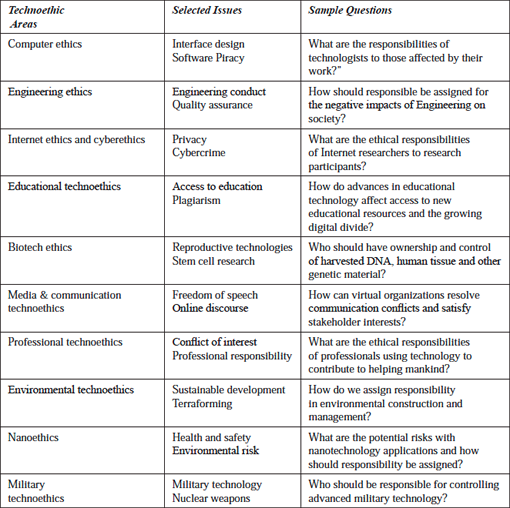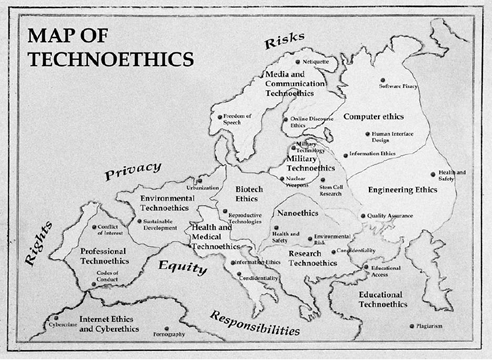Introductions: Technoethics no comments
Moor on Ethics & Technology
Moor (2005) believed that with an increase in the social impact of technological advances, the number of ethical challenges also increase. He suggested that this is a result of the ever-increasing novel uses of technological advances and a lack of ethical inquiry into these activities. For example, the Web has fundamentally altered the social contexts within which we live, work and play. It has raised several questions including some about the legitimacy of human relationships maintained using its platform, its facilitation of illegal activity on a large scale and the privacy of its users.
However, though these are very present and pressing societal issues, they are also vast areas for investigation, and there is relatively sparse research coverage. Also, an added dimension to this challenge is that technological advances seem to continuously change the standard ethical questions. Thereby researchers are forced to simultaneously attempt to explore the ethical implications of these technologies as they were, are now and could be in the future.
Technoethics: Tackling New Types of Ethical Questions
Unsurprisingly, many of the current debates surrounding technological advancement are addressed by technoethics (TE). They are some of the most challenging issues that scientists, innovators and technologists will face. These challenges usually characterise the roles these individuals play when plotting an ambitious route for the future. They inadvertently raise important questions about rights, privacy, responsibility and risk that must be adequately answered.

However, due to the variety of questions resulting in as much ethical inquiries that are based in different fields, there is a tendency for this knowledge to be somewhat disconnected. TE pulls this knowledge together around the central idea of technology. Moreover, unlike traditional applied ethics where focus is placed on an ethical concern for living things, TE is ‘biotechno-centric’. As the Web is to Web science, technology, as well as living things, are central in TE.
The Technoethics Way
Tracing its origins back to the late 1970s, TE emerged as an interdisciplinary field tasked with the job of answering the difficult questions posed earlier. Coined by Mario Bunge (1977), TE does not only assign technical responsibility to technologists but also gives them social and moral responsibility for their technological innovations and applications. It is believed that technologists are responsible for ensuring that their technologies are optimally efficient, not harmful and that its benefits are lasting.
This field distinguishes itself from other branches of applied ethics by elevating technology to the level of living things. However, it also builds on knowledge from wider ethical inquiry as well. TE has many sub-areas, for example, Internet, computer, biotech, cyber and nano ethics.

Calling All Web Scientists
Since the Web’s creation years ago, an understanding of this ever-changing phenomenon and its impact has been developing at a rapid pace in many disciplines. Yet there is a great deal more to learn, especially when the Web is positioned as the subject of focus. Considering Bunge’s views on technoethics, I believe that this obligation rests with Web scientists who are technically, morally and socially responsible for Web innovations and applications.

As a budding Web scientist, thinking about how technoethics applies to Web science, I am absolutely fascinated by all the very interesting questions that could be asked and that I could work towards answering. Ultimately, for us Web scientists, the aims of technoethics could be achieved by gaining insight into the relationship between people, the society and the Web, and how these entities impact each other.
Notes
This & Last Week’s Plan
Identifying the simplest books to read that will give an easy to understand introduction to the disciplines I picked.Making notes on books read.Prepare a blog post that gives an overview of what I want to work on.Publish a blog post that introduces technoethics.- Publish a blog post that introduces risk management.
Outline a reading plan for moving forward.
Introductory Readings
Ethics: A Very Short Introduction– Simon BlackburnHandbook fo Research on Technoethics– Rocci Luppicini & Rebecca AdellRisk: A Very Short Introduction– Baruch FischhoffFundamentals of Risk Management Understanding, Evaluating and Implementing Effective Risk Management– Paul Hopkin